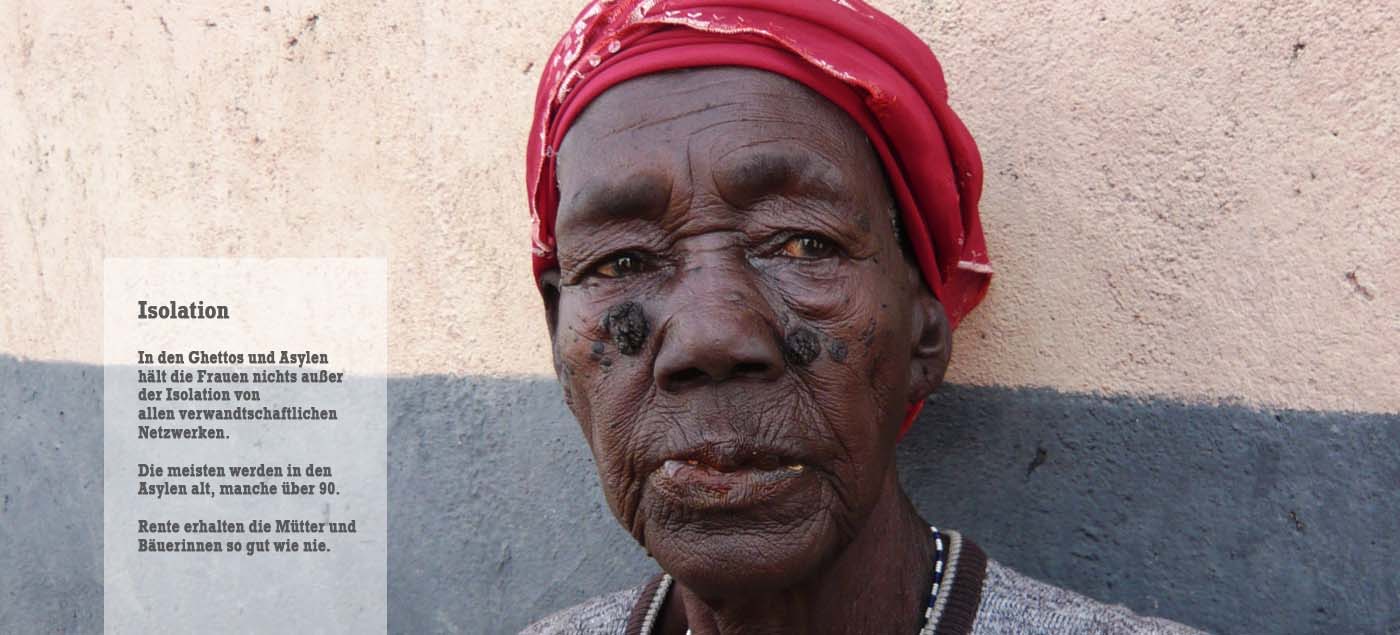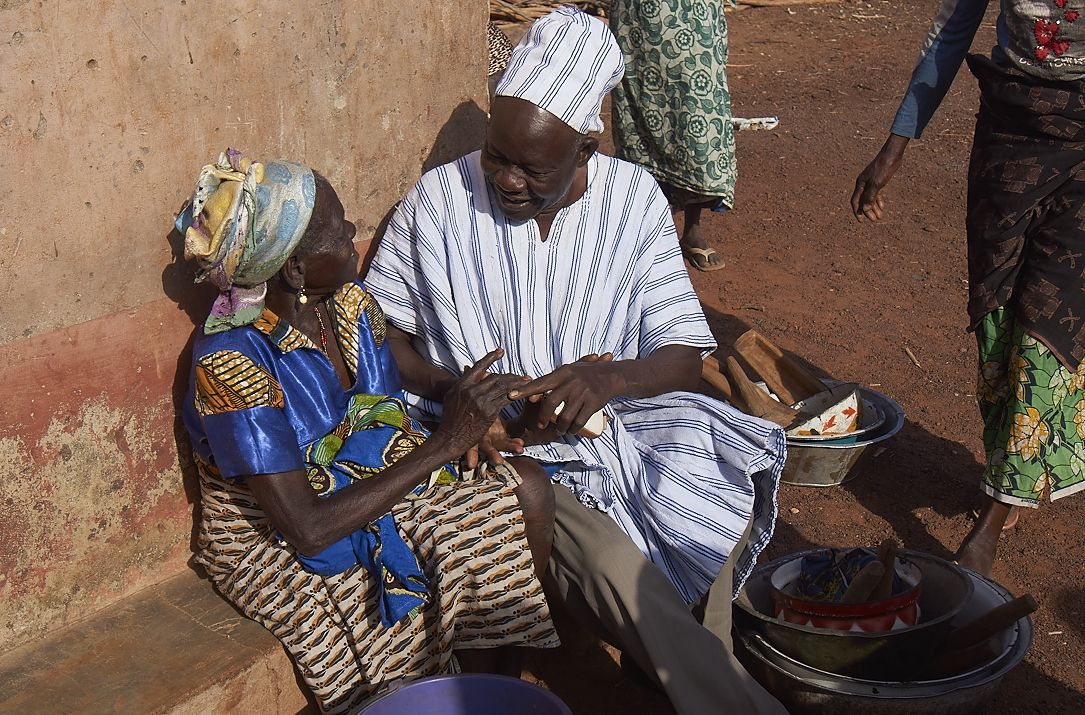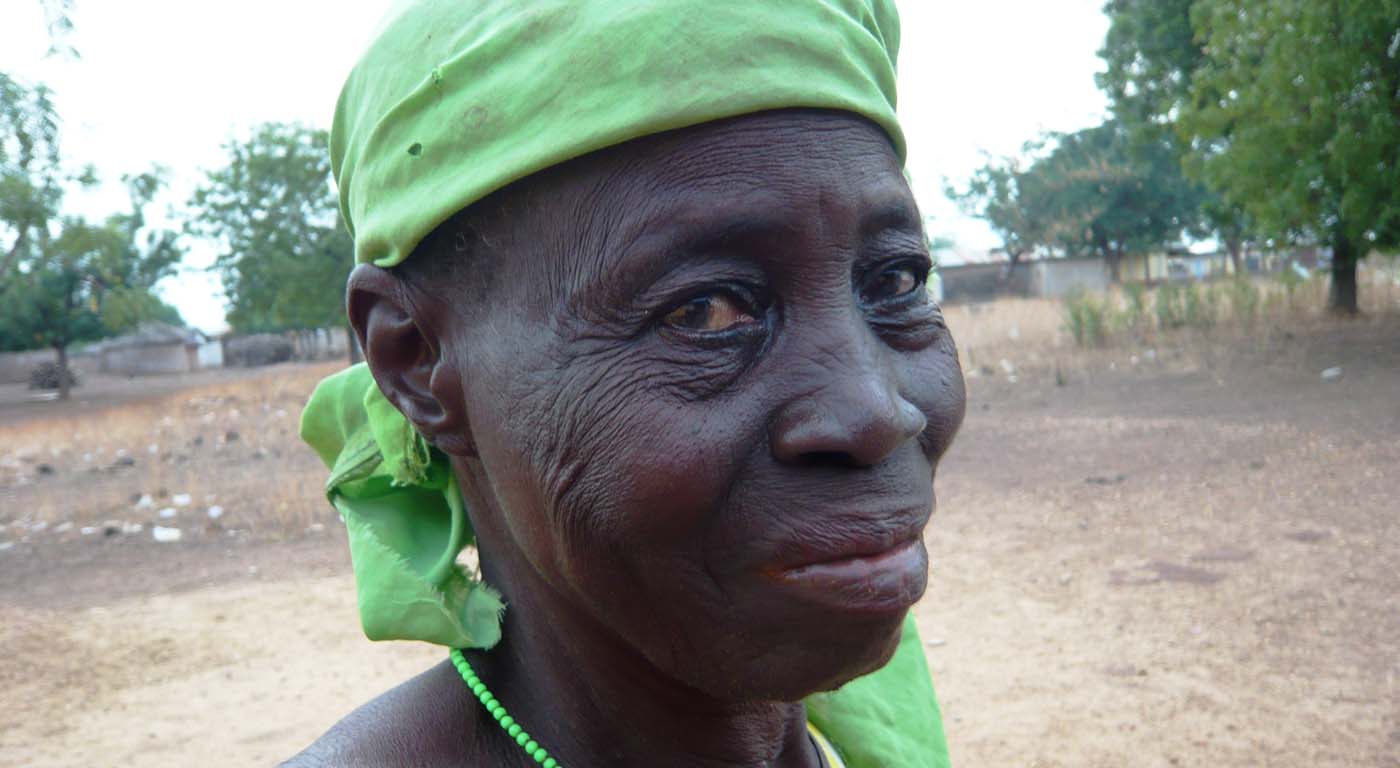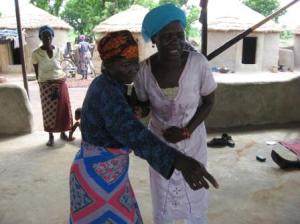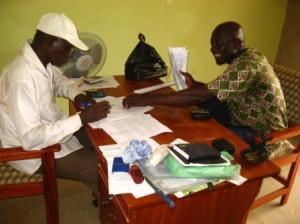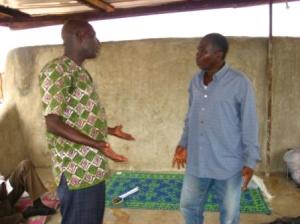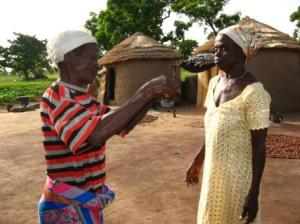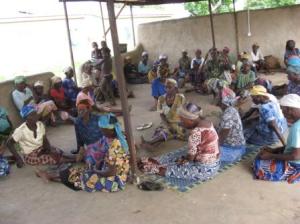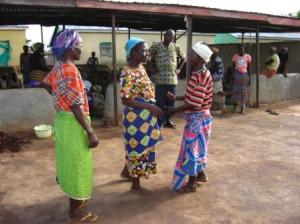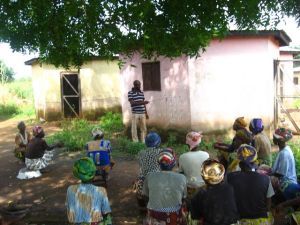Drama-Workshops
In Ghana, Drama-groups are a popular mode of challenging social taboos. It is a common sight to see groups of actors in public places, playing theater to boost HIV-prevention, to advertize hand-washing or in our case: to prevent witch-hunts.
The pictures below show a drama-workshop with the women from Gushiegu-sanctuary. They reenact an accusation. A professional actor trained them and developed the script together with Simon.
Alphabetization
The Witch-hunt Victims Empowerment Project (WHVEP) organizes primary education in the ghettos. Literacy and english are of utmost importance to those, who have never visited a school in their life. Schooling in the Northern Region has yet started in the recent decades and still fails to reach the majority of female children.
This is, why we insist that all children in the ghettos are enrolled in school. Those children could become advocates against witch-hunts.
On a regular base, the women are explained their constitutional rights.
Proximity and Contact
What awareness concerns, our team does the main work on the ground. Being close to the outcasts demonstrates to adjacent communities, that it isn’t harmful to eat or live together with “witches”.
At every step of their work the social workers discuss witchcraft-accusations. They know all the reactions and arguments. Simon Ngota is giving speeches from time to time at the market place in Gushiegu.
In case of resettlements negotiations are necessary. Negotiations push elders and families to reflect on their responsibility for individuals and to question violence and forced exile.
Witch-hunts and Media
Ghana boasts a thriving film-industry. One film lasts at least 120 minutes and youtube offers tons of them. Many of those films visualize witches and witchcraft. A popular movie is “End of the Wicked” by Helen Ukpabio and Teco Benson. The film is suspected to fan witch-hunts against children in Southern Nigeria.
http://www.youtube.com/watch?v=VRivyuU151Y
Another popular medium are storybooks. They contain a dozen of pages and are sold on markets as educational literature for the youth.
The Ghanaian storybook “Witches Night Club” mentions the ghetto in Gambaga:
“That is why at times when following someone who is suspected to be a witch and you blow dust at the heels and if she cleans her eyes it proves undoubtedly that she is a witche, that is why someone was declared a witch his or her social status in the society or tribe was lost forever.
This is the reason why we have a witchcamp at Gambaga in the Northern part of Ghana, because when you are declared a witch by a witch doctor, medicineman, a spiritualist or a pastor, nobody will have anything to do with you.
You are however regarded as an outcast. Most people use charm, amulets in form of rings and necklaces to protect themselves from the witches. Others also vaccinate themselves with black powder to protect themselves against witches, as they believe that this concoction can make their blood and the flesh bitter and tasteless to witches.
Some of us have evil eyes and when cast on a farm the crops wither. As they feed on human flesh which is their main food and before the person is killed by the witches, it’s not by fluke but rather a close witch relative might have handed over the soul od this victim to the witches.
When for instance your sister, brother or mother is a witch or wizard and it’s their turn to supply your soul for a sacrifice and they don’t want to do so because they love you, what they do is to give you a strange sickness like leprosy, fit and other disgraceful sickness. This will deter the witches from killing you because as you can’t use a sick fowl or hen for your meal so the witches also dislike sick souls.”
Media allows research about current witchcraft-notions. Nonetheless there is no dogma on witchcraft-beliefs. Christians, Moslems, Traditionalists (Sankofa and others) all share intensive and diverse beliefs about witchcraft. In the mentioned storybook, the author integrates the ghetto in Gambaga into his concepts of witchcraft.
A number of films and storybooks cunningly plays with occult stories: Those accused of witchcraft or ritualism are vindicated, the accusers themselves are exposed as selfish ritualists.
A Film against Witch-hunts?
In large parts of Northern Ghanas, TV’s are still rare in a common household. In colonial times, educational films were brought to villages by trucks. Today, drama-groups are the alternative to films. In Southern Nigeria, where films gain more audience, the “Witchcraft and Human Rights Network” funded a film to create awareness about child-witch-hunts and human trafficking. The film is called “The fake Prophet”:
We think, films are suitable as a medium of creating awareness, but that more efforts should be put into scripts and professional actors. Common audiences are used to insider jokes, metaphors and realistic scenarios.
Scientific Education
Our team focuses on medical education. Mockup-models and posters, microscopes and documentaries are in desperate need to explain epidemics and parasites. So far, we cooperate with nurses, who explain symptoms and contagion within the camps. Witch-hunts create the necessity to spread medical education to the villages that are clusters of witchcraft-accusations.
Meanwhile, research on the philosophical and psychological presuppositions of witch-hunts points out the need to grasp mechanisms of projection, of guilt, remorse and sexuality. Education in these areas relies on invisible, immaterial means of convincing people. The hard work of philosophical enlightenment can draw on a traditional predilection for proverbs. Proverbs are an early but perennial form of philosophical reflection. Vast parts of Greek and Roman philosophy consists of proverbs, later on Lichtenberg or Nietzsche were amploying aphorisms, in the 20th century Adorno fostered miniatures and fragments. Ghanaian Drama-groups often reenact and use proverbs. Regarding the importance of dreams for accusation, the proverbs “dreams are but shadows” or “dreams are ten a penny” should be established in Ghanaian proverbial culture.
Natural sciences contributed less than philosophy to combat witchcraft perceptions in Europe, but today they would enable us to work on specific problems in museums. A museum for natural history in Gushiegu would be a bargain and have tremendous effect. 25 m² compound with a basic selection of fossiles, minerals, posters and documentaries on vulcanism, continental drift and nature in general would proliferate sceptical stances on the complexity of nature in general. We plan to gather donations for such a project in the future in a seperate campaign.
This post is also available in: German
